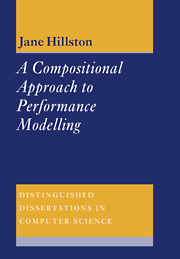Book contents
5 - Notions of Equivalence
Published online by Cambridge University Press: 24 November 2009
Summary
Introduction
In this chapter we develop a framework to analyse notions of equivalence between models. Within this framework we present several equivalences which have been applied to process algebra models and performance models. By notions of equivalence we mean criteria which may be applied to determine whether two entities can be considered to be, in some sense, the same. For example, a common concern for most modelling methodologies is model verification—the problem of ascertaining whether a model is the same as the system under study, in the sense of providing an adequate representation to meet the objectives of the study. For a performance model “adequate representation” is usually interpreted as the calculation of certain quantitative performance characteristics within acceptable error bounds. For a process algebra model it is interpreted as a condition on the observable behaviour of the model, as represented by its actions, compared with the observable or intended behaviour of the system.
The framework we consider identifies three different classes of entity-to-entity equivalence which may arise during a modelling study: system-to-model equivalence, model-to-model equivalence and state-to-state equivalence. We will see that for process algebra models these equivalences are all addressed by a single notion of equivalence, the bisimulation. Two agents are considered to be equivalent in this way when their externally observed behaviour appears to be the same. This is a formally defined notion of equivalence, based on the labelled transition system underlying the process algebra.
- Type
- Chapter
- Information
- A Compositional Approach to Performance Modelling , pp. 65 - 74Publisher: Cambridge University PressPrint publication year: 1996

